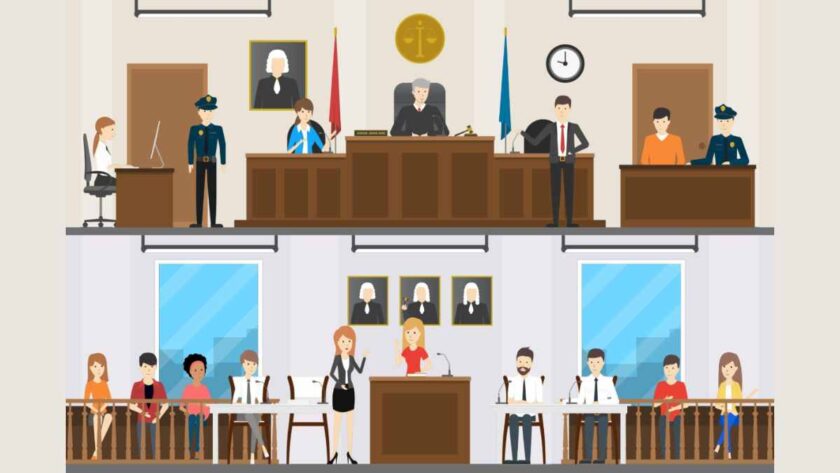Understanding the Stages of a Criminal Trial in India
Introduction
Navigating the Indian criminal justice system can be a complex and challenging experience, both for those accused of crimes and for those seeking justice. In fact, A crucial aspect of this system is the criminal trial process, which involves several distinct stages. In this article, we will delve into the intricacies of a criminal trial in India, breaking it down into comprehensible sections for a clearer understanding without a doubt.
The Key Stages of a Criminal Trial
1. Registration of FIR
- Complainant’s First Step: The process begins when a complainant reports a crime to the local police station by filing a First Information Report (FIR).
- Record and Documentation: Police officers record essential details such as the date, time, location, and nature of the incident. A copy of the FIR is provided to the complainant.
2. Investigation
- Gathering Evidence: Firstly, Police commence an investigation, collecting evidence, statements from witnesses, and relevant documents.
- Police Actions: This stage may involve searches, seizures, and interrogations to unearth crucial information.
- Charge Sheet Preparation: At the end of the investigation, the police prepare a detailed report known as a Charge Sheet, which summarizes the findings.
3. Arrest
- Legal Detention: Firstly, If deemed necessary based on the evidence and legal requirements, the police may arrest suspects.
- Informing Accused: Upon arrest, the accused must be informed of their rights and the reasons for their arrest.
4. Bail
- Bail Application: Accused individuals can seek bail during or after their arrest by filing a bail application in court.
- Judicial Consideration: The court considers factors like the seriousness of the offense and the risk of the accused fleeing before deciding on bail.
5. Charge Sheet
- Document Submission: Firstly, The police submit the Charge Sheet to the Magistrate, which contains information about the offense, the accused, and the gathered evidence.
- Commencement of Legal Proceedings: This submission marks the beginning of formal legal proceedings in the case.
6. Framing of Charges
- Defining the Allegations: Firstly, The court frames charges against the accused, specifying the allegations.
- Plea Hearing: The accused is given an opportunity to plead guilty or not guilty. If pleaded not guilty, the trial proceeds; otherwise, the court moves to sentencing.
The Criminal Trial Process
7. Trial
- Examination and Presentation: Firstly, The trial begins with the prosecution and defense presenting their cases in court. Witnesses are examined, and evidence is introduced.
- Cross-Examination: Both sides have the right to cross-examine witnesses presented by the opposing party. This aims to test the credibility and accuracy of testimony.
- Evidence Presentation: The presentation of evidence, including documents and exhibits, is a critical part of the trial.
8. Defense
- Accused’s Defense: The accused presents their defense, attempting to refute the prosecution’s case.
- Witnesses and Evidence: The defense can call witnesses and introduce evidence to support their claims.
Criminal Trial Closing Stages
9. Final Arguments
- Summarizing the Case: Both the prosecution and defense present their final arguments, summarizing their cases and highlighting key points.
- Persuasive Presentation: This stage allows lawyers to make persuasive arguments to influence the court’s decision.
10. Judgment
- Deliberation and Decision: The judge carefully considers the evidence, arguments, and relevant laws before pronouncing a verdict of guilty or not guilty.
- Legal Analysis: The judgment is based on a thorough analysis of the case, and the judge explains the rationale behind the decision.
11. Sentencing
- Determining Punishment: Firstly, If the accused is found guilty, the court determines the appropriate punishment, which may include fines, imprisonment, or other penalties.
- Factors Considered: Factors such as the gravity of the offense and applicable laws influence the sentencing decision.
Appeals and Legal Recourse in Criminal Trial
12. Appeal
- Appeal Options: Either party has the right to appeal the verdict or sentencing to a higher court.
- Review Process: Finally, The higher court reviews the case, examining it for legal errors, misconduct, or other grounds for appeal.
Tables: Stage of a criminal trial in India:
| Stage | Description | Key Actions and Information |
|---|---|---|
| 1. Registration of FIR | First Information Report filed by the complainant. | – Firstly, Complainant reports a crime to the local police station. |
| – Police record details, including the date, time, and location. | ||
| – FIR is registered, and a copy is provided to the complainant. | ||
| 2. Investigation | Police investigate the case, gather evidence, etc. | – Firstly, Collect evidence, including witness statements and documents. |
| – May conduct searches, seizures, and interrogations. | ||
| – Prepare a report detailing findings (Charge Sheet). | ||
| 3. Arrest | If necessary, suspects may be arrested. | – Firstly, Arrests are made based on evidence and legal procedures. |
| – Accused must be informed of their rights and reasons for arrest. | ||
| 4. Bail | Accused may seek bail during or after arrest. | – Firstly, Bail application filed in court. |
| – Court considers factors like seriousness of the offense. | ||
| 5. Charge Sheet | Police submit a report with evidence to the court. | – Firstly, Contains details of the offense, accused, and evidence. |
| – Submitted to the Magistrate for further proceedings. | ||
| 6. Framing of Charges | Court frames charges against the accused. | – Firstly, Accused is informed of the charges and asked to plead. |
| – If pleaded not guilty, trial proceeds; otherwise, sentencing. | ||
| 7. Trial | Witnesses are examined, evidence presented, etc. | – Firstly, Prosecution and defense present their cases in court. |
| – Cross-examination of witnesses and evidence presentation. | ||
| 8. Defense | Accused presents their defense and witnesses. | – Firstly, Accused’s opportunity to refute the prosecution’s case. |
| – Can call witnesses and present evidence in their favor. | ||
| 9. Final Arguments | Both sides present final arguments in court. | – Firstly, Prosecution and defense summarize their cases and evidence. |
| 10. Judgment | Court delivers a verdict of guilty or not guilty. | – Firstly, Judge considers evidence, arguments, and relevant laws. |
| – Pronounces the accused as guilty or not guilty. | ||
| 11. Sentencing | If guilty, the court determines the punishment. | – Firstly, Sentencing may include fines, imprisonment, or other penalties. |
| – Judge considers factors like severity of the offense and laws. | ||
| 12. Appeal | Parties may appeal to a higher court if necessary. | – Firstly, Either party can appeal the verdict or sentencing. |
| – Finally, Higher court reviews the case for legal errors or misconduct. |
Please keep in mind that the duration and complexity of each stage can vary significantly
Read More
- Bail services
- ILLEGAL DETENTION RESCUE
- Gangsters Munna Bhai & 11 others sentenced to death
- A compromise after the conviction cannot be granted any credence from the Supreme Court
- Unlocking the Power of Quashing: A Comprehensive Guide to Cases You Can Quash in Madras High Court
Conclusion
Knowing the steps of a criminal trial in India is crucial for people in the legal field and the public alike in any case. In fact, It’s a complex process, and each step has a clear role in seeking justice. While this article gives a general idea, it’s a good idea to ask legal experts for help in understanding the Indian criminal justice system.





